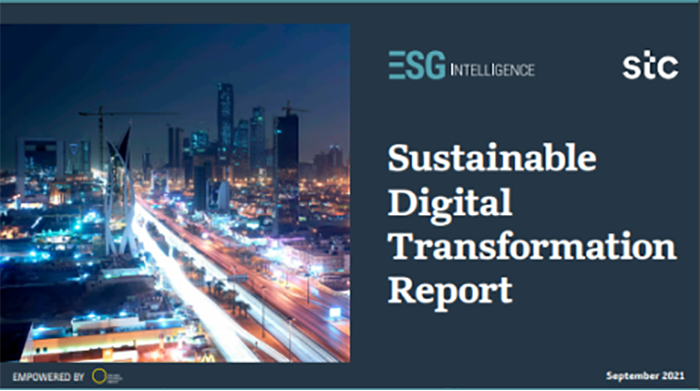A new environmental, social and governance (ESG) intelligence report, produced by Oxford Business Group, maps out how digital inclusion, technological innovation and environmental sustainability are being applied in Saudi Arabia’s telecoms industry, with a particular focus on stc.
The Sustainable Digital Transformation Report, produced by OBG’s ESG Intelligence department, provides in-depth analysis of Saudi Arabia’s long-term vision for economic advancement and diversification, and the ESG principles underpinning it, in an easy-to-navigate and accessible format, supported by key data and infographics.
Subscribers will find detailed coverage of how ESG principles are being applied in the digital economy in particular, and the steps being taken to ensure the benefits of digital transformation are extended to all segments of society, in line with the goals outlined in the Saudi Vision 2030 roadmap.
The report noted that the Wireless Broadband project initiated by the Ministry of Communications and Information Technology to expand broadband services to remote areas had achieved its main objectives of reaching 2.6m users in 500,000 homes, with an average internet access speed of 10 Mbps, by the end of 2020. Elsewhere, the report found that about 43% of the population in the Kingdom’s five largest cities received stc’s 5G network coverage in 2020.
Looking at stc’s operations, the report revealed that stc’s female workforce grew by 120% between 2018 and 2020, with women occupying 30% of leadership positions at the company.
Progress was also noted in energy usage, with a 16% decrease in electricity consumption and an 18% decrease in petroleum consumption recorded across stc facilities in 2020 compared to 2019. Elsewhere, stc now produces 100% of SIM cards from recycled plastic, compared to 33% in 2018.
The report also highlights the online migration of essential services and daily tasks during the Covid-19 pandemic, noting the part this played in increasing cashless transactions and, in turn, supporting financial inclusion and empowerment.
Steps taken by stc to combat cybersecurity threats are another area of focus, with the Kingdom ranked first in the region in terms of cybersecurity and 13th globally.
Other topical issues explored include moves under way to boost the non-oil economy by supporting the digital transformation of SMEs, sharpening the focus on local content in supply chains and driving forward the Saudisation initiative.
Jana Treeck, OBG’s Managing Director for the Middle East, said Saudi Arabia’s telecoms and digital technology industries had proved pivotal during the pandemic by providing online solutions and supporting broad-based business continuity in the face of social distancing measures and mobility restrictions.
“Looking ahead, we expect the Kingdom’s digital transformation to gain pace on the back of increasing awareness and uptake of technological innovations, paving the way for further development of the non-oil economy and the full realisation of the Kingdom’s 2030 vision,” Treeck said.
The Sustainable Digital Transformation Report forms part of a series of tailored studies which the global research and advisory company is currently producing with its partners, alongside other highly relevant, go-to research tools, including a range of ‘ESG in Focus’ articles and interviews.


COMMENTS